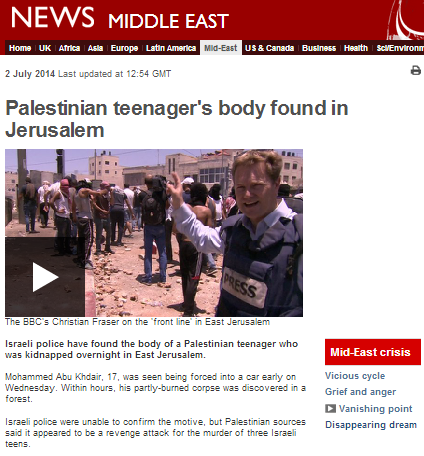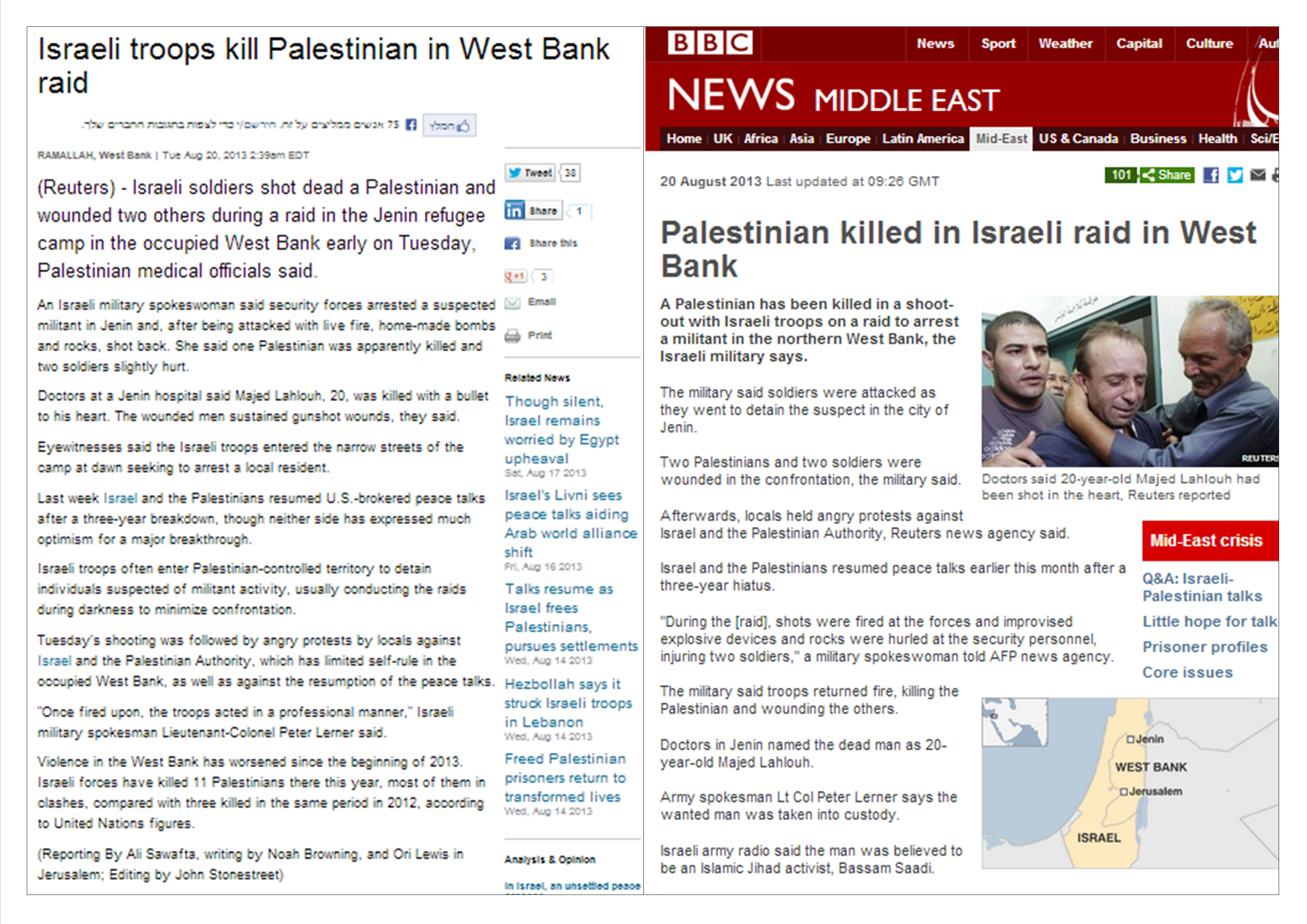At around 04:00 local time on the morning of July 2nd a teenager from the Jerusalem neighbourhood of Shuafat was reported missing. At 05:45 the Israeli police announced the discovery of a body in the Jerusalem forest but at that stage, no connection had been established between the two events.
Just over four hours later, and hours before the body had been officially identified, the BBC News website published the first version of an article which now appears under the title “Palestinian teenager’s body found in Jerusalem“. That initial version read as follows:
“Israeli police have found a body they believe may be that of a Palestinian teenager kidnapped in East Jerusalem.
A boy was seen being forced into a car in Beit Hanina early on Wednesday. Within hours, a body was discovered in a wood in Givat Shaul, to the west [sic].
Israeli police were unable to confirm the motive, but Palestinian sources said it appeared to be a revenge attack for the murder of three Israeli teens.
Later, Palestinians clashed with Israeli police outside the boy’s home.
The protesters threw stones at the officers, who reportedly responded by firing sound bombs and rubber bullets.”
Around an hour later, that article was amended and expanded (all changes to it can be viewed here). Despite the fact that at that stage the circumstances had still not been established and the body was still in the process of DNA identification, the second version of the article opened thus:
“Israeli police have found the body of a Palestinian teenager who was kidnapped overnight in East Jerusalem.
A boy was seen being forced into a car in Shufat [sic] early on Wednesday. Within hours, a partly-burned corpse was discovered in a forest in Givat Shaul.
Israeli police were unable to confirm the motive, but Palestinian sources said it appeared to be a revenge attack for the murder of three Israeli teens.”
In other words, despite the fact that the police and forensic investigations were still in their initial stages, (and in sharp contrast to its two-day wait in reporting the kidnapping of three Israeli teens on June 12th) the BBC was already telling its audiences that the teenager, Muhammed Abu Khdeir, had been kidnapped, that the body found in the forest was his and that the motive “appeared to be” a “revenge attack” by Israeli Jews.
Although the language used later on in that article is a little more guarded, nevertheless the BBC elected to promote and amplify a version of events which, even over 24 hours later, has still not been established as fact.
Yolande Knell was quoted in that article as saying:
“While there has been no confirmation that this was a revenge attack for the three murdered Israelis whose bodies were found in the West Bank earlier this week, there is no doubt among Palestinians here about what has happened.”
A quote from Kevin Connolly also advanced the same theory.
“The BBC’s Kevin Connolly says it is too early to say for sure, but there is a real possibility that the killing is a tit-for-tat reprisal, with all the dangers that would pose for the broader relationship between Israel and the Palestinians.”
Knell’s quote appeared in all five subsequent versions of the report and Connolly’s quote in all but the most recent version, which was published just before 3 p.m. local time.
Just before 7 p.m. local time the police spokesman made the following announcement:
“Police spokesman Micky Rosenfeld says police are investigating the possibility that the motive behind the abduction and killing of Muhammad Abu Khdeir was criminal or an honor killing, as well as the option that it was nationalistically motivated.
“There are no clear-cut conclusions at the moment,” he says. “We will have to see how things develop.” “
On the same evening the Minster for Public Security also made a statement.
“Minister Aharonovitch emphasized that at this stage all avenues of investigation are being checked and added that the motive for the murder cannot be determined at present. The Minister noted that units in Jerusalem and around the country are being reinforced and asked the public to show restraint and patience at this time in order to allow the investigators to carry out their work.” [emphasis added]
The BBC News website, along with other BBC platforms, continues however to promote and amplify an unproven, highly inflammatory and – as past experience shows – potentially very dangerous version of events which at this stage is based entirely upon supposition and speculation.
Is this really the standard of reporting expected from an organisation which informs its funding public that “BBC News aspires to remain the standard-setter for international journalism”?




